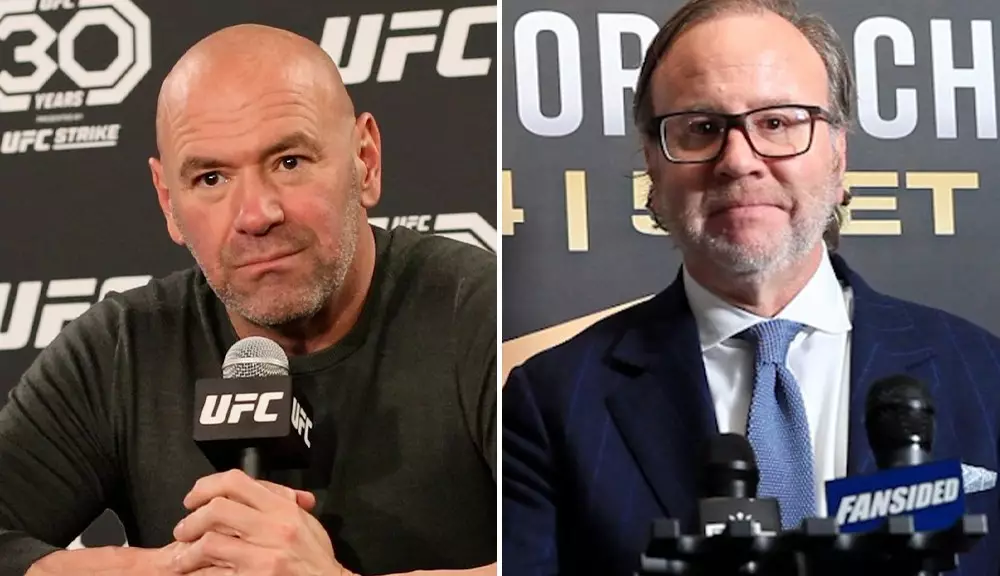The mixed martial arts (MMA) world has long been dominated by the Ultimate Fighting Championship (UFC), but a new challenger has emerged—Professional Fighters League (PFL). What once seemed like a benign rivalry is now evolving into a fierce clash, exacerbated by recent accusations and pointed remarks exchanged between the two organizations. The situation escalated rapidly after the PFL’s event, Battle of the Giants, stirring up public attention and debate surrounding the metrics of success in MMA promotions.
The heart of the dispute lies in differing metrics of success among promotions. Donn Davis, the CEO of PFL, recently claimed in an interview that his organization was outperforming UFC in certain statistics, a bold assertion that caught Dana White’s attention. Prompted to respond, White not only dismissed Davis’s claims but did so with a surprising degree of preparation—arriving with printouts of comparison data. The UFC president launched a detailed counterattack, not just contestants’ ticket sales or view counts, but extending his criticism to the fledgling Power Slap League, positioning it as a superior entity compared to PFL.
This confrontation raises a critical question about how success is measured in the realm of sports promotions. While ticket sales and social media engagement certainly play a role, other factors, such as brand loyalty and fighter talent, are essential to consider. White’s insistence that Power Slap somehow eclipses PFL in terms of success reflects an attempt to undermine PFL’s credibility, but it also highlights how important perception is in drawing fans to a particular promotion.
Before PFL’s acquisition of Bellator, White seldom acknowledged the organization. However, the recent merger has shifted the ladder of competition, leading to frequent public references between the two promotions. Davis’s assertive tactics openly aligning PFL with UFC’s reputation is a strategy that diverges sharply from the more reserved approach of Scott Coker, Bellator’s former president. The increasing tensions have shifted the back-and-forth into a combative narrative; the respect previously exhibited is now traded for antagonism.
The public’s attention on this rivalry, particularly in the context of Dana White’s Contender Series, offers insight into White’s penchant for dramatization. When faced with questions about PFL, White seems to relish these moments, using them as opportunities to not only defend UFC’s supremacy but to promote his own narrative. This is not merely a disagreement; it is a carefully orchestrated display that aims to draw in fans and stakeholders alike, perpetuating the idea that UFC remains the gold standard in MMA.
At a time when the competition is intensifying in the landscape of MMA promotions, the keywords emanating from the UFC and PFL feud call attention to the metamorphosing dynamics of the sport itself. As PFL aims to forge its own identity and carve out a significant market share by taking innovative approaches—like their season-based format and unique fighter contracts—they have also drawn the ire of White and the UFC. These developments could reshape MMA as they push for new technologies, broadcasting partnerships, and marketing strategies.
This rivalry does more than just reflect personal animosities; it signifies the presence of a thriving market for MMA talent. Fighters have more options than ever before and can leverage this competitive atmosphere to secure better contracts. As fans and fighters alike tune into the war of words and metrics, the increased competitiveness might ultimately benefit them through the elevation of production quality, fighter care, and market outreach.
The growing animosity between UFC and PFL is a multifaceted spectacle characterized by ongoing discourse over credibility, success metrics, and promotional strategies. As both organizations vie for attention, it becomes clear that this evolving rivalry could have lasting impacts not just on their respective futures but on the entire industry of MMA. The true winners in this escalating face-off may ultimately be the fans and fighters as each organization pushes the boundaries of what is possible in this captivating sport.

